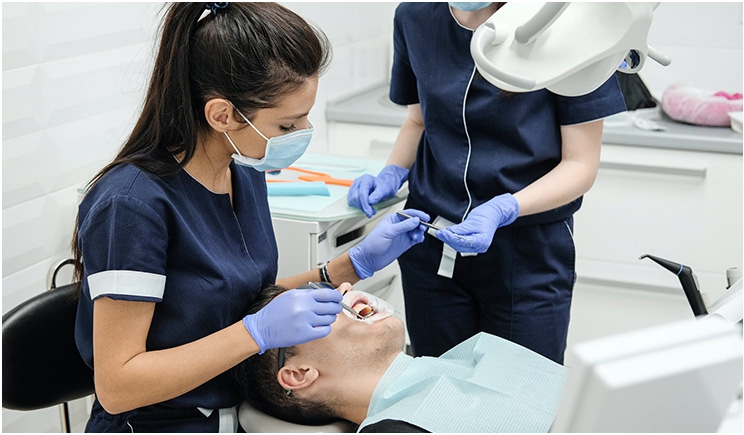
It’s no secret that dental hygiene is considered a great profession. In fact, year after year, it is recognized as such. US News and World Report recently released its annual Best Jobs list, ranking dental hygienists fifth in Best Healthcare Support and number 32 overall. The field of dental hygiene offers some outstanding perks and satisfaction for many.
The initial draw to dental hygiene is the salary for many, with a median salary reported as $76,220. In some areas, it tops over $100,000 annually. With a low unemployment rate, 0.5%, and a large expected employment growth rate of 5.9% through 2029, a career as a dental hygienist appeals to many. In addition, the Bureau of Labor Statistics expects 13,300 additional jobs to open up in the future.
Dental hygienists can enter the field with an associate’s degree in most cases, although many continue to a bachelor’s and even master’s degrees. But to earn a dental hygiene license to practice, one has to complete more than just a degree. It also involves passing national, regional, and state exams. Entry level positions to work clinical hygiene are open with an associate’s degree, though teaching in academia and various other positions usually requires a bachelor’s or master’s degree.
Dental hygiene also provides various opportunities outside of traditional clinical practice where most of the dental hygiene workforce is employed. Dental therapy, independent practice, and outreach programs bring care to some of the most needed members of society. The adoption of teledentistry enables hygienists to practice in alternative settings and still meet the supervision requirements necessary by the licensing state. A career in dental hygiene offers the flexibility to work full or part time as desired, which can be very valuable when it comes to work-life balance.
Communication skills and interaction with patients are just as important in dental hygiene as clinical skills. Recognizing patient barriers to treatment and homecare involve critical thinking and problem solving.
Hygienists are much more than the “pick and polish” dental workers that the public perceives us as. We not only assess the oral condition and screen for oral cancer and systemic disorders. We are the key to oral disease prevention, all while creating connections with those we treat. In reality, many of us become friends with our patients, making a dental appointment as much of a social hour as it is a preventative and educational visit.
Every Profession Has Its Challenges
The salary and flexibility can be alluring, but dental hygiene also presents an array of challenges. Unlike nursing, which has national licensure, dental hygienists must be licensed in each state they chose to practice in. This means taking state exams and possibly the need to retake regional exams as well, depending on the state. If you move often, it can be costly to obtain and maintain multiple licenses to practice.
The wear and tear on the body, including repetitive injury, affects many hygienists at some point in their career. Carpal tunnel, hip, shoulder, neck, and hand injuries are common complaints among hygienists and can be career-ending. Twisting, turning, leaning, and repetitive motions can put an unusual strain on the body. Investing in self-care and the equipment to decrease the chance of musculoskeletal injury is key to ensure a long-lasting career in dental hygiene.
Dental hygiene can be emotionally and physically exhausting. Difficult patients and the aches and pains in the body combined make some question their career choice. However, most of us find job satisfaction in making a difference in the lives of our patients. I have had patients I cried with, laughed with, and even a few who made me think a six-month preventative visit just might be too soon.
Eyes on the Future
The field of dental hygiene continues to adapt, bringing more independence to the profession than we had 10 years ago.
Dental therapists, remote practice, and other opportunities are made possible through legislation and advancements in technology. The expected job growth and need for hygienists throughout the county will continue, and schools will continue to bring new and eager hygienists into the job market.
A career in dental hygiene is demanding both mentally and physically. However, it can be incredibly rewarding and profitable, and it can create bonds that withstand the years.
Ms. Collins is a clinical practicing hygienist in Idaho and Washington. She has been in the dental field for more than 20 years, both as an assistant and hygienist. With a passion for patient care, especially for those with greater risk factors, she enjoys sharing the tips and tricks of the dental profession through speaking and writing for multiple publications. In addition to clinical practice, she is a speaker and educator who has contributed to multiple textbooks, curriculum development, and key opinions. She can be contacted at jamiecollins.rdh@gmail.com or at mydentaleducator.com.
Related Articles
Dental Hygiene Named Fifth Best Healthcare Support Job
Q&A: Dental Hygiene as a Top Job With Maureen Howes of Aspen Dental
Dental Hygiene Treatment Intersects With COVID-19 Prevention











